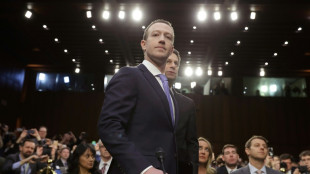-
 Japan PM's tax giveaway roils markets and worries voters
Japan PM's tax giveaway roils markets and worries voters
-
Amid Ukraine war fallout, fearful Chechen women seek escape route

-
 Rybakina surges into Melbourne semis as Djokovic takes centre stage
Rybakina surges into Melbourne semis as Djokovic takes centre stage
-
Dollar struggles to recover from losses after Trump comments

-
 Greenland blues to Delhi red carpet: EU finds solace in India
Greenland blues to Delhi red carpet: EU finds solace in India
-
Will the EU ban social media for children in 2026?

-
 Netherlands faces 'test case' climate verdict over Caribbean island
Netherlands faces 'test case' climate verdict over Caribbean island
-
Rybakina stuns Swiatek to reach Australian Open semi-finals

-
 US ouster of Maduro nightmare scenario for Kim: N. Korean ex-diplomat
US ouster of Maduro nightmare scenario for Kim: N. Korean ex-diplomat
-
Svitolina credits mental health break for reaching Melbourne semis

-
 Japan's Olympic ice icons inspire new skating generation
Japan's Olympic ice icons inspire new skating generation
-
Safe nowhere: massacre at Mexico football field sows despair

-
 North Korea to soon unveil 'next-stage' nuclear plans, Kim says
North Korea to soon unveil 'next-stage' nuclear plans, Kim says
-
French ex-senator found guilty of drugging lawmaker

-
 US Fed set to pause rate cuts as it defies Trump pressure
US Fed set to pause rate cuts as it defies Trump pressure
-
Sleeping with one eye open: Venezuelans reel from US strikes

-
 Venezuela's acting president says US unfreezing sanctioned funds
Venezuela's acting president says US unfreezing sanctioned funds
-
KPop Demon Hunters star to open Women's Asian Cup

-
 Trump warns of 'bad things' if Republicans lose midterms
Trump warns of 'bad things' if Republicans lose midterms
-
Russian strikes in Ukraine kill 12, target passenger train

-
 With Maduro gone, Venezuelan opposition figure gets back to work
With Maduro gone, Venezuelan opposition figure gets back to work
-
Celebrities call for action against US immigration raids

-
 Rubio to warn Venezuela leader of Maduro's fate if defiant
Rubio to warn Venezuela leader of Maduro's fate if defiant
-
Denver QB Nix 'predisposed' to ankle injury says coach

-
 Lula, Macron push for stronger UN to face Trump 'Board of Peace'
Lula, Macron push for stronger UN to face Trump 'Board of Peace'
-
Prass stunner helps Hoffenheim go third, Leipzig held at Pauli

-
 Swiss Meillard wins final giant slalom before Olympics
Swiss Meillard wins final giant slalom before Olympics
-
CERN chief upbeat on funding for new particle collider

-
 Trump warns US to end support for Iraq if Maliki returns
Trump warns US to end support for Iraq if Maliki returns
-
Judge reopens sexual assault case against goth rocker Marilyn Manson

-
 South Korea's ex-first lady to learn verdict in corruption case
South Korea's ex-first lady to learn verdict in corruption case
-
Rosenior dismisses Chelsea exit for 'untouchable' Palmer

-
 Markram powers South Africa to win over West Indies
Markram powers South Africa to win over West Indies
-
Vladimir Padrino: Venezuela's military power broker

-
 Amazon closing Fresh and Go stores in Whole Foods push
Amazon closing Fresh and Go stores in Whole Foods push
-
Koepka nervous about game and fans in PGA Tour return

-
 Trump's Iowa trip on economy overshadowed by immigration row
Trump's Iowa trip on economy overshadowed by immigration row
-
Dortmund coach says Inter Milan are improved under Chivu

-
 US border chief in Minneapolis as Trump tries to calm crisis
US border chief in Minneapolis as Trump tries to calm crisis
-
What to know about America's colossal winter storm

-
 Iran warns against 'instability' after US strike group arrives
Iran warns against 'instability' after US strike group arrives
-
GM reports quarterly loss but boosts shareholder returns

-
 US banks fight crypto's push into Main Street
US banks fight crypto's push into Main Street
-
NFL Bills make offensive coordinator Brady new head coach

-
 TikTok settles hours before landmark social media addiction trial
TikTok settles hours before landmark social media addiction trial
-
Newcastle braced for 'ultimate test' against PSG after storm disruption

-
 Brook blitz ends Sri Lanka's unbeaten home run, England clinch series
Brook blitz ends Sri Lanka's unbeaten home run, England clinch series
-
LVMH 2025 net profit drops 13% to 10.9 bn euros

-
 Philip Glass pulls Kennedy Center premiere after Trump takeover
Philip Glass pulls Kennedy Center premiere after Trump takeover
-
Slot says Liverpool must fix 'very bad cocktail'

Web-tracking 'cookies' meant to protect privacy: inventor
The data-tracking "cookies" at the heart of concerns over online privacy were meant to shield people, rather than serve as cyber snoops, their inventor told AFP.
California-based engineer and entrepreneur Lou Montulli said the original "cookie" he created decades ago was intended to make life online easier by letting websites remember visitors.
Yet the technology has become a lightning rod, attacked for helping tech companies collect data on consumers' habits key to the targeted web ad business that makes many billions of dollars per year.
"My invention is at the technological heart of many of the advertising schemes, but it was not intended to be so," said Montulli, who created them in 1994 while an engineer at Netscape.
"It is simply a core technology to enable the web to function," he said.
Google joined a growing list of tech companies this week by announcing a new plan to block certain types of cookies, after the online ad giant's previous proposals were roundly criticized.
When discussing his invention, Montulli said the software snippets that let a website recognize individuals helped make possible features such as automatic log-ins or remembering the contents of e-commerce shopping carts.
Without what are called "first-party" cookies -- which also are used by websites to interact directly with visitors -- every time a person went online, they would be treated as though it were their first time.
But Montulli pointed to trouble with so-called "third-party" cookies, those generated by websites and tucked into visitors' browsers, and ad networks that aggregate data from those snippets.
"It is only through collusion between many websites and an ad network that ad tracking is allowed to happen," Montulli argued.
Websites share activity data with ad networks, which then use it to target ads for all their members.
- Online ads arms race -
"If you search on some strange niche product and then you get bombarded with ads for that product at a number of websites, that is a weird experience," Montulli said.
"It is normal human pattern recognition to think if they know I was looking for blue suede shoes, they must know everything about me; then think I want to get out of this."
Governments have taken notice, with the latest consequence being French authorities fining Google and Facebook 210 million euros ($237 million) this month over their use of cookies.
If one website in a network also collects personally identifying information about a user, say a name or email, that could be "leaked" in a way that enables a browser to be associated with a person.
"It's a network effect of all these different websites colluding together with the ad trackers," Montulli said. "Cookies were originally designed to provide privacy."
He said one possible response would be to stop targeting ads and start charging subscriptions for online services, which run on online advertising revenue.
Montulli also supports phasing out third-party cookies, but warned getting rid of the software snippets altogether would drive advertisers to employ more stealthy tactics.
"Advertising will find a way," he said. "It will become a technological arms race; considering the billions of dollars at risk, the ad industry will do what they need to keep the lights on."
Turning off third-party cookies could also unintentionally punish small websites by shutting them out of targeted ads that make money, giving even more power to tech giants such as Apple, Google and Facebook-parent Meta.
Regulation that keeps cookies in use, mandating controls such as letting users opt in or out of sharing data, may be the only viable long-term solution, Montulli said.
"You really couldn't use the web without cookies," he said. "But, we are going to need to be more nuanced about how they are used in advertising."
I.Meyer--BTB

